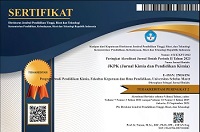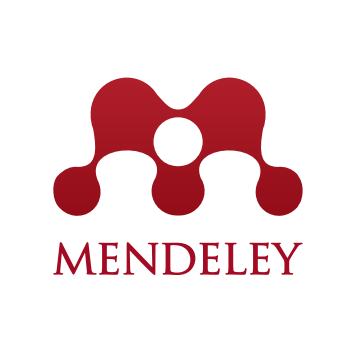Development Learning Cycle 5E Module Integrated with Science, Technology, Engineering, and Mathematics (STEM) in Thermochemistry
Abstract
The success of the learning process is something that needs to be considered in 21st-century learning. One of the successes in teaching and learning uses appropriate learning models. One of the 21st-century learning models is the 5E Learning Cycle integrated with Science, Technology, Engineering, and Mathematics (STEM). This learning model encourages student activities in the teaching and learning process, with the encouragement of student activities, students' science process skills will grow. Science process skill is one of skill that student must have in 21st-century learning. One effort to encourage students' process skills is to use a virtual laboratory. This research aims to develop a 5E Learning Cycle module integrated with STEM and is equipped using a virtual laboratory (www.chemcollective.org) on thermochemistry material. This study's subjects were students of class XI of state high schools in the city of Kediri. This research is a Research and Development (R&D). The data collected through interview, observation, and questionnaires. The results of this study are: students need a teaching material that can drive the student achievement of the teaching and learning process in the 21st century in thermochemistry material; module validity which is declared valid by a severe expert (v = 0.89); The module developed shows effective results seen from the learning outcome on thermochemistry material and the module can foster science process skill
Keywords
Full Text:
PDFReferences
G. Rahmawati, "Buku teks pelajaran sebagai sumber belajar siswa di perpustakaan sekolah di SMAN 3 bandung". Edulib, 5(1),pp. 102-113, 2015.
Hs. Lasa, “Penyusunan Artikel dan Publikasi Sekunder”, Tangerang Selatan: Universitas Terbuka, 2014
W. Maba, Teacher’s perception on the implementation of the assessment process in 2013 curriculum. International journal of social sciences and humanities, vol. 1, no. 2, pp. 1-9, 2017.
F. S.Irwansyah, Y. M. Yusuf, I. Farida, and M. A. Ramdhani, Augmented reality (AR) technology on the android operating system in chemistry learning. In IOP conference series: Materials science and engineering 288(1), p. 012068, 2018.
DOI:10.1088/1757-899X/288/1/012068
A. Shoimin, "68 Model Pembelajaran Inovatif dalam kurikulum 2013", Yogyakarta: Ar-Ruzz Media, 2014
R. W Bybee, "The BSCS 5E instructional model and 21st Century Skills", A commissioned paper prepared for a workshop exploring the intersection of science education and the development of 21st-century skills, 2009.
L. D. English, "STEM education K-12: Perspectives on integration." International Journal of STEM education, vol. 3, no. 1, p. 3, 2016.
D. P. Sari and R. M. Dewi, “Pengaruh Ketrampilan Berpikir Kritis dan Berpikir Kreatif Terhadap Hasil Belajar Mata Pelajaran Ekonomi Kelas X IPS di MAN Mojosari” Jurnal Pendidikan Ekonomi, vol. 5, no. 1, pp. 1-8, 2017.
F. Zorlu and Y. Zorlu, “Comparison of Science Process Skill with STEM career interest of Middle School Student”, Universal Journal of Educational Research, vol. 12, no 5, pp. 2117-2124, 2017.
A. Lepiyanto, “Analisis Ketrampilan Proses Sains pada Pembelajaran Berbasis Praktikum”, Bioedukasi: Jurnal Pendidikan Biologi, vol 2, no 5, pp. 156-161, 2014.
DOI:10.24127/bioedukasi.v5i2.795
M. C.Li and C. C. Tsai, “Game-based learning in science education: A review of relevant research.” Journal of Science Education and Technology, vol. 22, no. 6, pp. 877-898, 2013.
DOI:10.1007%252Fs10956-013-9436-x
W. Arifin, L. Latisma, and B. Oktavia, “Development Module of Chemistry Learning Based on Chemo-entrepreneurship Oriented”, vol. 7, no. 1, pp. 51-56, 2018
S. Yamtinah, M. Masykuri, Ashadi, and A. S. Shidiq, “An Analysis of Students’ Science Process Skills in Hydrolysis Subject Matter Using Testlet Instrument” ICTTE, 158, pp. 101–110, 2017.
Juhji, “Peningkatan Ketrampilan Proses Sains Melalui Pendekatan Inkuiri Terbimbing”, Jurnal Penelitian dan Pembelajaran IPA. vol 1., no. 2, pp. 58-70, 2016.
Aswita, Rusman, and R. F. I. Rahmayani, “Identifikasi Kesulitan Siswa dalam Memahami Materi Termokimia dengan Menggunakan Three-Tier Multiple Choice Diagnostic Instrument di Kelas XI MIA 5 MAN Model Banda Aceh”, Jurnal Ilmiah Mahasiswa Pendidikan Kimia (JIMPK), vol. 2, no. 1, pp. 35-44, 2016.
Zakiyah, S. Ibnu, and Subandi, “Analisis Dampak Kesulitan Siswa pada Materi Stoikiometri terhadap Hasil Belajar Termokimia”, Jurnal Kimia dan Pendidikan, vol. 3, no. 1, pp. 119-134, 2018.
DOI:10.30870/educhemia.v3i1.1784
A. C. Sugiarti, S. Suyatno, and I. G. M. Sanjaya, “The Development of Learning Material using Learning Cycle 5E Model Based STEM to Improve Students’ Learning Outcomes in Thermochemistry”, International Conference on Science Education, vol. 1006, pp. 1-7, 2018
DOI:10.1088/1742-6596/1006/1/012039
W. R. Borg and M. D. Gall, Educational Reseach: An Introduction, New York: Longman, 2012.
Gunawan, A. Harjono, Hermansyah, and L. Herayanti, "Guided Inquiry Model Through Virtual Laboratory to Enhance Students' Science Process Skills On Heat Concept", Cakrawala Pendidikan, vol. 38, no.2, 2019.
D. Yaron, M. Karabinos, D. Lange, J. G. Greeno, and G. Leinhardt, “The ChemCollective – Virtual Labs for Introductory Chemistry Courses”, Science Prize for Online Resources in Education, vol. 328, pp. 584-585, 2010.
S. Petersen and K. Hack, "The thermochemistry library ChemApp and its applications". International journal of materials research, vol. 98, no. 10, pp. 935-945, 2007.
D. A.Sari, I. Iswendi, and B. Bayharti, "Making Chemical Snakes and ladders Game as Learning Media on Hydrocarbon Compound Material for Senior High School". International Journal of Progressive Sciences and Technologies, vol. 21, no. 1, pp. 115-122, 2020.
M. P. Chen, Y. T. Wong, and L. C. Wang, "Effects of type of exploratory strategy and prior knowledge on middle school students’ learning of chemical formulas from a 3D role-playing game". Educational Technology Research and Development, vol. 62, no. 2, pp. 163-185, 2014.
DOI:10.1007%2Fs11423-013-9324-3
N. H. D. Huri and M. Karpudewan “Evaluating the Effectiveness of Integrated STEM-lab Activities in Improving Secondary School Student: Understanding of Electrolysis.” Chem. Edu. Res Prac, vol. 20, pp 495-508, 2019.
L. N. Calkins and A. Welki, "Factors that influence choice of major: Why some students never consider economics", International Journal of Science Economics, vol. 33, no. 8, pp. 547-564, 2006.
W. L. Kuechler, A. McLeod, and M. G. Simkin, "Wy don't more students major in IS?", Decision Science Journal of Inovation Education, vol. 7, no. 2., pp. 463-488, 2009.
DOI:10.1111/j.1540-4609.2009.00231.x
S. Liao and E. Chao, "Intention to adopt knowledge through virtul communities: posters vs lukers", Online Information review, vol. 36, no. 3, pp. 442-461, 2012.
M. P. Kelsch and A. B. Werremeyer, "Poster Project to Emphasize Public Health in The Pharmacy Curriculum", American Journal of Pharmaceutical Education, vol. 75, no. 1, pp. 1-8, 2011.
S. S. Maulidah and E. C. Prima, "Using Physics Education Technology as Virtual Laboratory in Learning Waves and Sounds", Journal of Science Learning, vol. 3, no. 1, pp. 116-121, 2018.
N. Sulistiowati, L. Yuanita, and Wasis, "Perbedaan Penggunaan Laboratorium Real dan Laboratorium Virtual pada Ketrampilan Proses Sains dan Hasil Belajar Siswa Materi Asam Basa", Pendidikan Sains Pascasarjana Universitas Negeri Surabaya, vol. 3, no. 2, pp. 191-197, 2013.
DOI:10.26740/jpps.v2n2.p191-197
I. Hawkins and A. .J. Phelps, "Virtual Laboratory vs. Tradisional Laboratory: Which is More Effective for Teaching Electrochemistry?", Chemistry Education Research and Practice, Issue 4, no. 14, pp. 516-523, 2013.
R. M. Situmorang, Muhibbuddin, and Khairil, “Penerapan Model Pembelajaran Problem Learning unuk Meningkatkan Hasil Belajar Siswa pada Materi Sistem Ekskresi Manusia”, Jurnal EduBio Tropika, vol. 3, no. 2, pp. 51-97, 2015.
Refbacks
- There are currently no refbacks.








